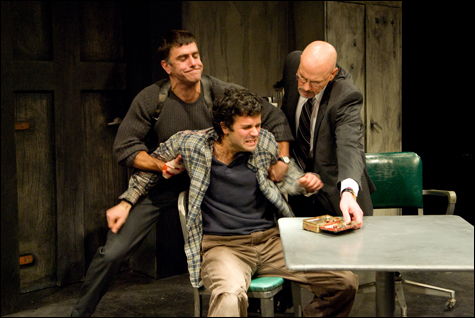The art of violenceGamm’s Pillowman is unsettling February 5,
2008 5:51:59 PM

INTENSE INTERROGATION: Kidd, Estrella, and Catanzaro.
|
There are slasher flicks and Quentin Tarantino, of course, and bloody Grand Guignol melodramas on the stage. But when it comes to serious theater, nowhere else has a playwright forced our faces up to violence to challenge art about how much reality it can take.
Martin McDonagh’s The Pillowman is likely to have upset ticket-holders fleeing the theater at every performance, even though it’s the Gamm Theatre that is staging it (through February 24). The play tells of the most horrific atrocities that can be inflicted, the torture and murder of children. But the most frightening thing about this play is the prospect that less than first-rate actors can perform it, skating upon its sensationalism rather than sinking into its depths.
The performers at the Gamm, an Actors Equity theater, however, are doing wonders under the sure hand of director Peter Sampieri. The result is an unflinching and instructive act of imagination that taught me, for one, something I hadn’t fully realized about what theater can accomplish: a play can become powerful while remaining playful, rather than getting tearful, and plunge straight into the pain of the human condition rather than skirt around it.
The setting is straight Kafkaesque absurdity. We are in a gray, grimy interrogation room of an unnamed police state. Katurian (Tony Estrella) is a meek but talkative abattoir cleaner-upper who writes horror stories in his spare time. He has been brought in for questioning by a thuggish cop, Ariel (Steve Kidd), and a droll police detective,Tupolski (David Catanzaro). Some of Katurian’s short-stories depict the torture-slayings of children, and there has been a spate of such killings that the police are investigating. Katurian is chipper and willing — eager, even — to cooperate, in the manner of anyone who believes that that his innocence is protection enough. But he eventually hears his mentally challenged brother, Michael (Christopher Francis Byrnes), screaming from the adjacent torture chamber and realizes that they might not be just joking around about summary execution.
Shakespeare kept his violence behind the arras, as often as not, since it was usually the consequences rather than the actions themselves that were significant. For Irish playwright McDonagh, the tendency of our species to act from our reptile brain is largely the source of our difficulties. So making us witness violent acts by sometimes otherwise sympathetic people in his darkly comic dramedies is his way of making us confront what we might otherwise avoid and finesse. In The Beauty Queen of Leenane, a hand is forced onto a hot stove. In The Lieutenant of Inishmore, which deals with attitudes behind the Troubles, six gallons of fake blood were needed for each Broadway performance. And so on.
Not that the violence depicted here is more than a little roughing up. No, McDon¬agh has outdone the onstage dismemberments he’s come up with elsewhere, merely by the un-detailed mention of the torture of children. The ultimate abomination.
The matter that it’s left to our imagination is exactly the point here. The playwright seems to have fashioned The Pillowman as a theatrical defense of his employing violence so extremely in his other plays.
This play forces us to separate our emotions from the brutality, to become like doctors or homicide detectives — or horror story writers — for the moment so that we can think clearly about what’s before us. Brechtian alienation attempts the same, and to my mind not as well, since the missing laugh-so-we-don’t-cry component in The Threepenny Opera and the like strips drama of full human dimension.
The Gamm actors do wonders seemingly effort-free. (The trick is to come up with the right effort.) Estrella, the theater’s artistic director, does his usual attentive work, keeping the hapless Katurian attuned to every nuance around him. A newcomer to Gamm, Catanzaro (a district attorney on TV’s Brotherhood) is perfectly cast, physically imposing but loose-mannered, staying potentially feral behind his tough-guy humor. As for Kidd, we must remember that he was capable of playing a Macy’s elf in Santaland, so his stretching into the role of a sadistic cop displays a remarkable range. More than anyone in the play, he shows how light and dark can combine in the same character without blanding out into gray. Karen Carpenter and Andrew Morissette do good, and varied, supporting work as two contrasting pairs of mothers and fathers.
Once again the Gamm has accomplished a remarkable feat of theater.
|
 |

|
- Why is it that one out of 125 Gloucester residents is a junkie?
- Never mind its tough-girl alt-porn feminism: SuicideGirls has already moved on to a new generation
- Some Things at Trinity
- Since George W. Bush took office, the United States has sunk to unprecedented lows in sports and pop-culture domination
- What is driving the widespread movement pressuring Hillary to drop out, even though she is very much still in the race?
- This week in social activism
- How did BU's research facility go from slam dunk to almost sunk?
- What is driving the widespread movement pressuring Hillary to drop out, even though she is very much still in the race?
- Trying to find some meaning in ace biz-boy columnist Steve Bailey’s move to London
- Style and substance, hold the meat
- 2nd Story’s Orpheus Descending
- Opera House captures Boston Ballet’s heart
|
-
Goodness by the gallon
-
Trinity’s gleeful Blithe Spirit
-
Jason Simon ends his run inThe Producers
-
PC brings Fanny Brice back to life
-
Mark Peckham directs a ‘scary piece’
-
2nd Story’s Orpheus Descending
-
Literary life
-
Gamm’s Boston Marriage is a ticklish toss-off
-
The Narragansetts’ Stories in Stone
-
Cornerstone revives Neil Simon’s Biloxi Blues
|

|